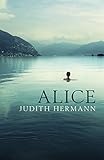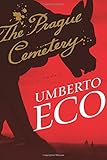Umberto Eco’s fifth novel, The Prague Cemetery is the headline choice for this year’s Independent Foreign Fiction Prize, the winner of which is due to be announced on May 14.
Eco’s sprawling tale of gluttony and global conspiracy heads an eclectic and surprising six-strong shortlist, which also includes stories rooted in 17th-century Iceland, wartime Ukraine and Finland, and modern-day Germany and rural China. Yan Lianke’s pitch-dark Dream Of Ding Village makes another appearance having also been shortlisted for this year’s MAN Asian Literary Prize.
Uniquely among literary prizes, the £10,000 fund is split equally between the winning author and translator.
Alice by Judith Hermann (from German; trans. Margot Bettauer Dembo)
 The clarity of Judith Hermann’s prose won her a place on the shortlist for Alice, a collection of five inter-linking short stories based around a single central protagonist and the death of a different friend or acquaintance. Technically it’s hard to fault, but the repetitive nature of the stories sometimes drags. The problem is not in the book’s observational qualities, but in its fundamental lack of insight. People die and she moves on, illuminating little about the process of grief, and prompting the reader to question precisely what Hermann had in mind when it came to creating this slim volume. She’s a novelist of considerable repute in Germany, so she’s probably way better placed to answer the question. Until she does, in the context of a major literary shortlist, Alice will remain entirely, perplexingly unremarkable.
The clarity of Judith Hermann’s prose won her a place on the shortlist for Alice, a collection of five inter-linking short stories based around a single central protagonist and the death of a different friend or acquaintance. Technically it’s hard to fault, but the repetitive nature of the stories sometimes drags. The problem is not in the book’s observational qualities, but in its fundamental lack of insight. People die and she moves on, illuminating little about the process of grief, and prompting the reader to question precisely what Hermann had in mind when it came to creating this slim volume. She’s a novelist of considerable repute in Germany, so she’s probably way better placed to answer the question. Until she does, in the context of a major literary shortlist, Alice will remain entirely, perplexingly unremarkable.
Blooms of Darkness by Aharon Appelfeld (from Hebrew; trans. Jeffrey M. Green)
 Appelfeld is a prominent Israeli novelist who has written over 40 works of fiction, most concerning the Holocaust. Blooms Of Darkness tells the story of Hugo, an 11-year-old Jewish boy, who escapes the Nazis in an unnamed town in Ukraine by hiding out in a cupboard in a local brothel. Hugo befriends a prostitute, Mariana, and as the novel develops so does their relationship: some might say, given Hugo’s age, in a somewhat unlikely and/or disturbing fashion. Appelfeld’s story is based on truth: he escaped a Nazi concentration camp in 1941 and hid out in a forest with, as he puts it, “underworld figures.” Appelfeld would be the first to admit Blooms Of Darkness is nothing particularly new, but it is nevertheless a worthy addition to the literature of the Holocaust. Its most significant triumph is its understated prose — so heartfelt it could almost have been written in a whisper.
Appelfeld is a prominent Israeli novelist who has written over 40 works of fiction, most concerning the Holocaust. Blooms Of Darkness tells the story of Hugo, an 11-year-old Jewish boy, who escapes the Nazis in an unnamed town in Ukraine by hiding out in a cupboard in a local brothel. Hugo befriends a prostitute, Mariana, and as the novel develops so does their relationship: some might say, given Hugo’s age, in a somewhat unlikely and/or disturbing fashion. Appelfeld’s story is based on truth: he escaped a Nazi concentration camp in 1941 and hid out in a forest with, as he puts it, “underworld figures.” Appelfeld would be the first to admit Blooms Of Darkness is nothing particularly new, but it is nevertheless a worthy addition to the literature of the Holocaust. Its most significant triumph is its understated prose — so heartfelt it could almost have been written in a whisper.
Dream of Ding Village by Yan Lianke (from Chinese; trans. Cindy Carter)
 Lianke’s grim tale of a Chinese blood-selling scandal which sweeps an HIV epidemic through countless small communities was also shortlisted for the MAN Asian Literary Prize. Unsurprisingly banned in his homeland, Dream Of Ding Village serves as a damning indictment of China’s irresistible push towards a form of controlled capitalism. It serves as a vicious allegory of the whole bust-up Chinese communist machine. With the villagers dying in scores, the rabidly profiteering blood-sellers must seek out ever more inventive ways to maintain their cash flow. Blackmail and corruption are rife: this is a society rendered hopelessly naïve by long years of bludgeoning single-party rule. Lianke is merciless in heaping misery upon his subjects, which makes this a terribly bleak book. But it is also highly readable, and undeniably important.
Lianke’s grim tale of a Chinese blood-selling scandal which sweeps an HIV epidemic through countless small communities was also shortlisted for the MAN Asian Literary Prize. Unsurprisingly banned in his homeland, Dream Of Ding Village serves as a damning indictment of China’s irresistible push towards a form of controlled capitalism. It serves as a vicious allegory of the whole bust-up Chinese communist machine. With the villagers dying in scores, the rabidly profiteering blood-sellers must seek out ever more inventive ways to maintain their cash flow. Blackmail and corruption are rife: this is a society rendered hopelessly naïve by long years of bludgeoning single-party rule. Lianke is merciless in heaping misery upon his subjects, which makes this a terribly bleak book. But it is also highly readable, and undeniably important.
From The Mouth of the Whale by Sjon (from Icelandic; trans. Victoria Cribb)
 From the Oscar-nominated composer Sjon comes his second novel, From The Mouth Of The Whale, which is every bit as baffling and brilliant as his first, The Blue Fox, which was previously longlisted for the prize. Set in volcanic 17th-century Iceland, where snow burns and whales grow to the size of mountains, Sjon conjures a fantastical tale of the purging of pagan rituals and the banishment of a scientist and doctor, Jonas Palmason The Learned, to a remote island as punishment for his alleged heresy. There are exorcisms, infant deaths, an uproarious sketch involving unicorn horns and, in the book’s most unforgettable scene, the brutal slaughter of a band of visiting Basque whalers. Sjon’s rich, almost mythical prose never falters for a moment, and the extraordinary success of Victoria Cribb in losing none of its potency in her translation from its original Icelandic deserves to be celebrated. This is a wild, tumultuous, utterly unique novel.
From the Oscar-nominated composer Sjon comes his second novel, From The Mouth Of The Whale, which is every bit as baffling and brilliant as his first, The Blue Fox, which was previously longlisted for the prize. Set in volcanic 17th-century Iceland, where snow burns and whales grow to the size of mountains, Sjon conjures a fantastical tale of the purging of pagan rituals and the banishment of a scientist and doctor, Jonas Palmason The Learned, to a remote island as punishment for his alleged heresy. There are exorcisms, infant deaths, an uproarious sketch involving unicorn horns and, in the book’s most unforgettable scene, the brutal slaughter of a band of visiting Basque whalers. Sjon’s rich, almost mythical prose never falters for a moment, and the extraordinary success of Victoria Cribb in losing none of its potency in her translation from its original Icelandic deserves to be celebrated. This is a wild, tumultuous, utterly unique novel.
New Finnish Grammar by Diego Marani (from Finnish; trans. Judith Landry)
 New Finnish Grammar is a wholly admirable book, telling the story of a sailor found grievously wounded on the quayside in Trieste towards the end of the Second World War. He has lost both his memory and his language, and carries no identifying documents. Taken in by a passing Finnish doctor, Petri Friari, the pair struggle to rebuild his identity: Friari convinces himself the man is also Finnish, on account of a nametag found in his jumper, and sends him to Helsinki in the hope of reigniting some dormant memories. There, he (re-) introduces his subject to the notoriously complicated Finnish language, evoking myths and legends of his country’s past as the mystery of the man’s identity slowly begins to unfurl. Marani highlights important issues surrounding language and identity, and if it is a little dry at times, valuing intelligence over intimacy, he has written a technically excellent and thought-provoking book.
New Finnish Grammar is a wholly admirable book, telling the story of a sailor found grievously wounded on the quayside in Trieste towards the end of the Second World War. He has lost both his memory and his language, and carries no identifying documents. Taken in by a passing Finnish doctor, Petri Friari, the pair struggle to rebuild his identity: Friari convinces himself the man is also Finnish, on account of a nametag found in his jumper, and sends him to Helsinki in the hope of reigniting some dormant memories. There, he (re-) introduces his subject to the notoriously complicated Finnish language, evoking myths and legends of his country’s past as the mystery of the man’s identity slowly begins to unfurl. Marani highlights important issues surrounding language and identity, and if it is a little dry at times, valuing intelligence over intimacy, he has written a technically excellent and thought-provoking book.
The Prague Cemetery by Umberto Eco (from Italian; trans. Richard Dixon)
 The extrovert, octogenarian Italian is back with a book many are calling his best yet. Fans of Eco will recognize his style from the start: grueling, disconcerting and often frustrating, it often feels that Eco is deliberately taking liberties with his reader, and yet The Prague Cemetery is astonishingly vivid, and never less than engaging. Eco weaves fact and fiction to devastating effect to unveil the mystery of a real-life document entitled The Protocols Of The Elders Of Zion, which was contrived to unite nations against the (supposed) Jewish plot for world domination, and would later by cited by Hitler in Mein Kampf. A master forger, Simone Simoncini, who has tricked and murdered his way through Turin and Paris, is tasked with creating the document. It is its inherent truth which gives The Prague Cemetery an extra dimension. It serves as devastating proof of how falsehoods can shape history, and misery can be heaped upon whole peoples by the stroke of a pen.
The extrovert, octogenarian Italian is back with a book many are calling his best yet. Fans of Eco will recognize his style from the start: grueling, disconcerting and often frustrating, it often feels that Eco is deliberately taking liberties with his reader, and yet The Prague Cemetery is astonishingly vivid, and never less than engaging. Eco weaves fact and fiction to devastating effect to unveil the mystery of a real-life document entitled The Protocols Of The Elders Of Zion, which was contrived to unite nations against the (supposed) Jewish plot for world domination, and would later by cited by Hitler in Mein Kampf. A master forger, Simone Simoncini, who has tricked and murdered his way through Turin and Paris, is tasked with creating the document. It is its inherent truth which gives The Prague Cemetery an extra dimension. It serves as devastating proof of how falsehoods can shape history, and misery can be heaped upon whole peoples by the stroke of a pen.









